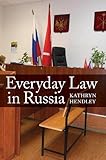Everyday Law in Russia / Kathryn Hendley.
Material type: TextPublisher: Ithaca, NY : Cornell University Press, [2017]Copyright date: ©2017Description: 1 online resource (304 p.)Content type:
TextPublisher: Ithaca, NY : Cornell University Press, [2017]Copyright date: ©2017Description: 1 online resource (304 p.)Content type: - 9781501708107
- Courts of first instance -- Russia (Federation)
- Courts -- Russia (Federation)
- Law -- Social aspects -- Russia (Federation)
- Law -- Russia (Federation)
- Rule of law -- Russia (Federation)
- History
- Legal History & Studies
- Soviet & East European History
- LAW / International
- contemporary Russia, Russian law, conflict resolution, Russian courts, Russia's new justice, judicial independence, justice law
- 349.47 23
- KLB68 .H46 2017
- online - DeGruyter
| Item type | Current library | Call number | URL | Status | Notes | Barcode | |
|---|---|---|---|---|---|---|---|
 eBook
eBook
|
Biblioteca "Angelicum" Pont. Univ. S.Tommaso d'Aquino Nuvola online | online - DeGruyter (Browse shelf(Opens below)) | Online access | Not for loan (Accesso limitato) | Accesso per gli utenti autorizzati / Access for authorized users | (dgr)9781501708107 |
Browsing Biblioteca "Angelicum" Pont. Univ. S.Tommaso d'Aquino shelves, Shelving location: Nuvola online Close shelf browser (Hides shelf browser)

|

|

|

|

|

|

|
||
| online - DeGruyter Who Should Rule at Home? : Confronting the Elite in British New York City / | online - DeGruyter The City Is the Factory : New Solidarities and Spatial Strategies in an Urban Age / | online - DeGruyter Suburb : Planning Politics and the Public Interest / | online - DeGruyter Everyday Law in Russia / | online - DeGruyter Fear and Fortune : Spirit Worlds and Emerging Economies in the Mongolian Gold Rush / | online - DeGruyter New York Amish : Life in the Plain Communities of the Empire State / | online - DeGruyter Margery Kempe and the Lonely Reader / |
Frontmatter -- Contents -- Figures -- Tables -- Acknowledgments -- Note on Transliteration, Translations, and Exchange Rates -- Abbreviations and Commonly Used Russian Words -- Introduction -- 1. Legal Consciousness(es) in Russia -- 2. Dealing with Damage from Home Water Leaks -- 3. Dealing with Auto Accidents -- 4. The View from the Benches of the Justice-of-the-Peace Courts -- 5. The View from the Trenches of the Justice-of-the-Peace Courts -- Conclusion -- Appendix A -- Appendix B -- Appendix C -- Russian Legal Sources -- References -- Index
restricted access online access with authorization star
http://purl.org/coar/access_right/c_16ec
Everyday Law in Russia challenges the prevailing common wisdom that Russians cannot rely on their law and that Russian courts are hopelessly politicized and corrupt. While acknowledging the persistence of verdicts dictated by the Kremlin in politically charged cases, Kathryn Hendley explores how ordinary Russian citizens experience law. Relying on her own extensive observational research in Russia’s new justice-of-the-peace courts as well as her analysis of a series of focus groups, she documents Russians’ complicated attitudes regarding law. The same Russian citizen who might shy away from taking a dispute with a state agency or powerful individual to court might be willing to sue her insurance company if it refuses to compensate her for damages following an auto accident. Hendley finds that Russian judges pay close attention to the law in mundane disputes, which account for the vast majority of the cases brought to the Russian courts.Any reluctance on the part of ordinary Russian citizens to use the courts is driven primarily by their fear of the time and cost—measured in both financial and emotional terms—of the judicial process. Like their American counterparts, Russians grow more willing to pursue disputes as the social distance between them and their opponents increases; Russians are loath to sue friends and neighbors, but are less reluctant when it comes to strangers or acquaintances. Hendley concludes that the "rule of law" rubric is ill suited to Russia and other authoritarian polities where law matters most—but not all—of the time.
Mode of access: Internet via World Wide Web.
In English.
Description based on online resource; title from PDF title page (publisher's Web site, viewed 26. Apr 2024)


